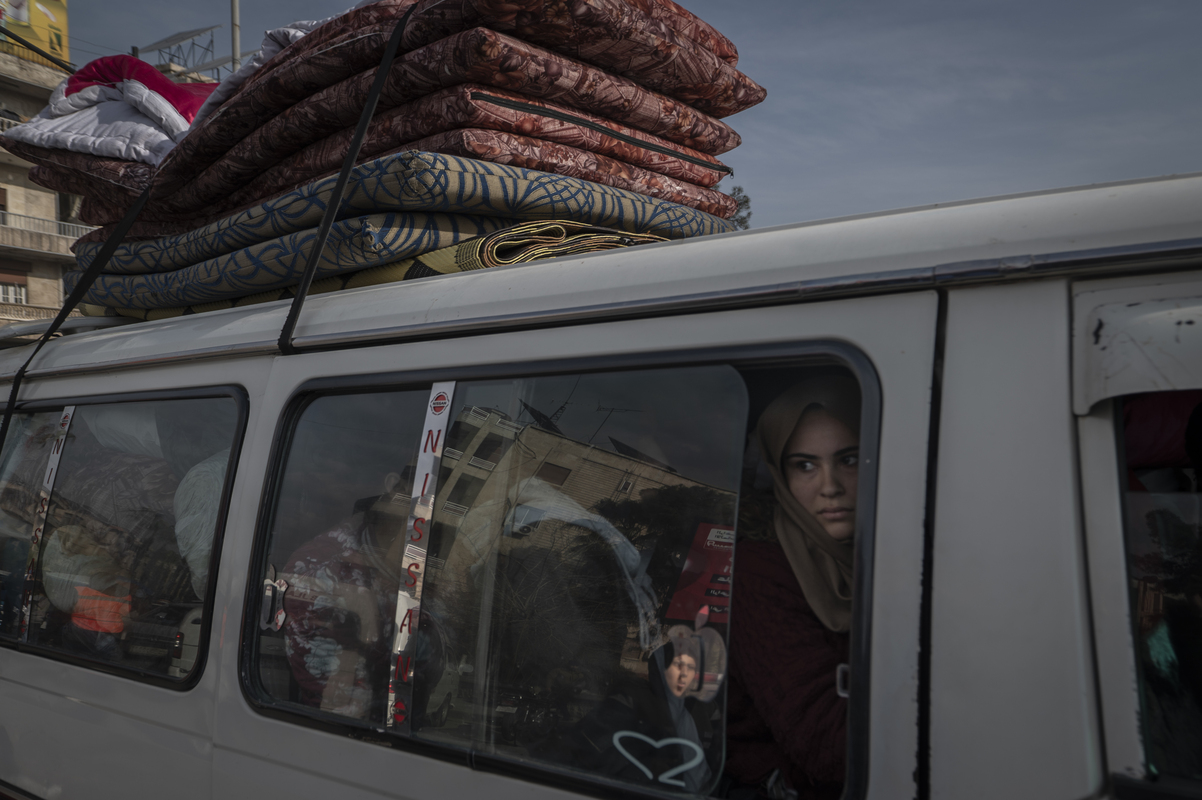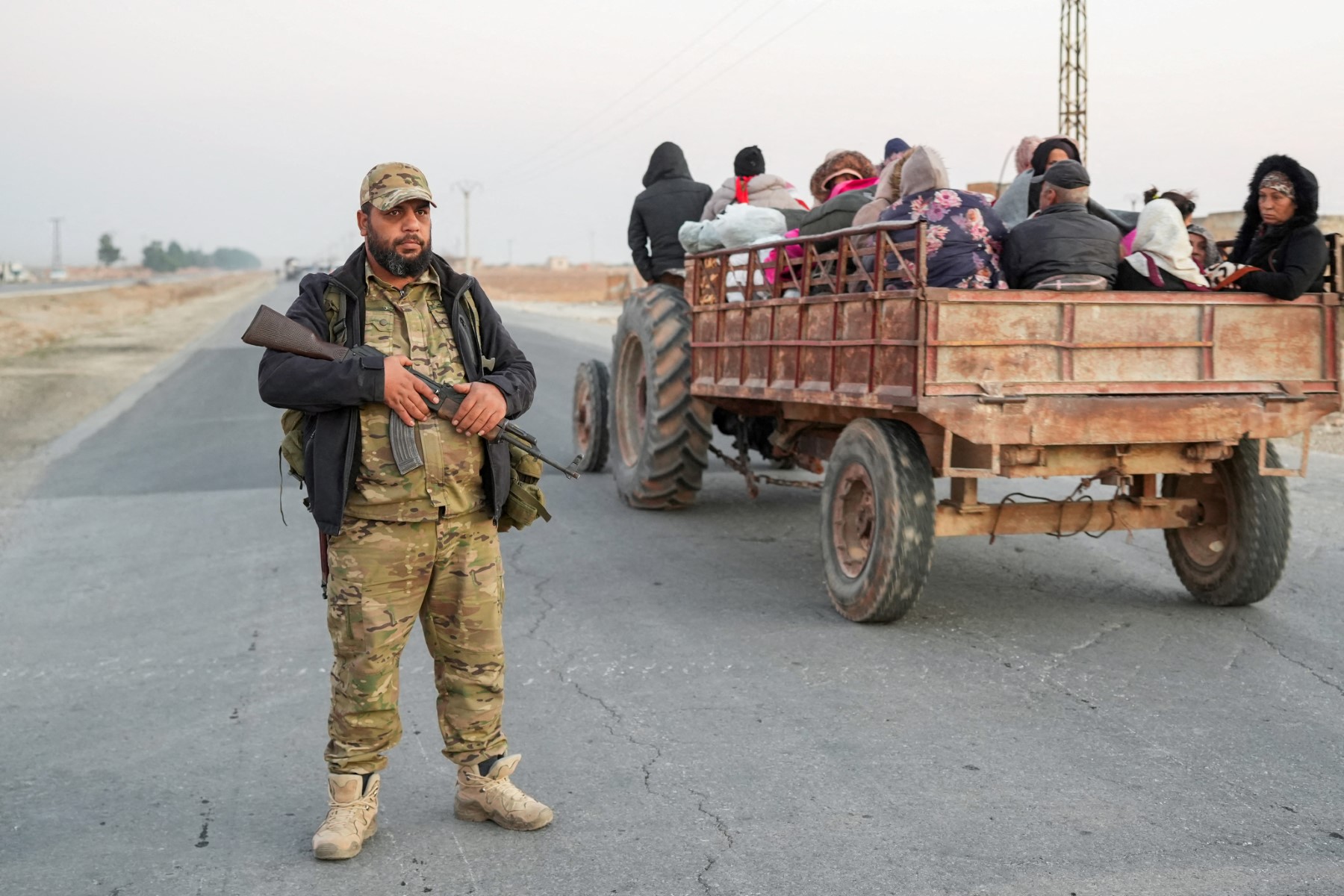Syria Elects a New Parliament in an Unprecedented Vote
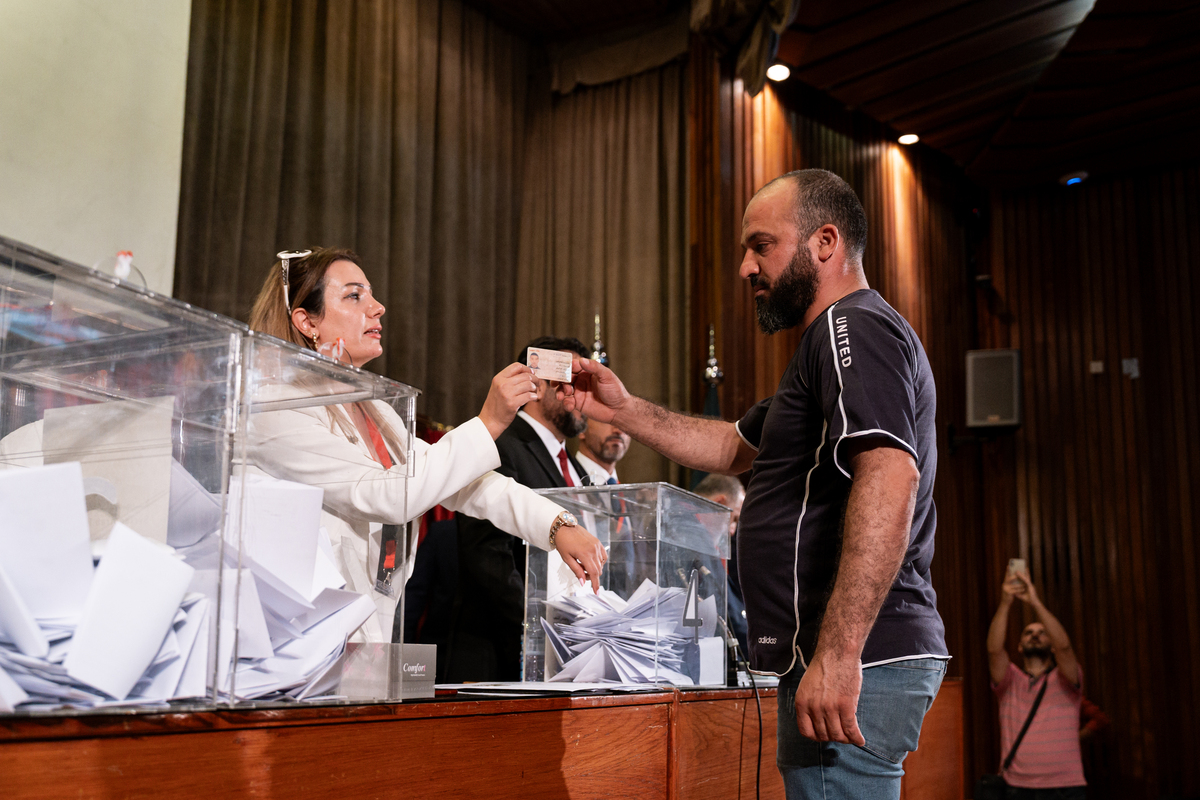
On Sunday, 5 October, Syria held its first post-Assad parliamentary elections at the National Library in Damascus. Damascus, 5 October 2025.
Picture Credit: Pauline Gauer
In Damascus, the counting of the votes unfolded in solemn silence. Ten months after the fall of Bashar al-Assad, Syria is choosing a new Parliament – not through universal suffrage, but through a few thousand “electoral delegates”— seen by supporters of the interim government as a necessary step toward rebuilding political institutions, yet one still marked by deep democratic limits in a country scarred by fourteen years of war.
Inside the National Library, turned into a counting hall on Sunday for the occasion, everything felt both serious and improvised on 5 October 2025. Among piles of ballots, a member of the electoral committee broke the silence.
“Sir, what did you write there?”
The addressed man rose, corrected a typo, and signed his correction. Solemnity on the one hand, improvisation on the other.
Five polling booths stood on a raised platform. The candidates watched the committee’s desk from behind. The smell of cardamom coffee drifted through the air as a man in traditional attire moved between the seats, serving tiny cups in silence. Armed men stood by the doors, motionless.
“It’s the first time I’ve ever taken part in an election. Before, I always boycotted — under Assad, it was theater,” said Moatasem Arar, a 35-year-old lawyer. “Putting a paper in a box feels indescribable. You play with your country’s destiny after decades of dictatorship.” He smiled faintly, as if still unsure it was real.
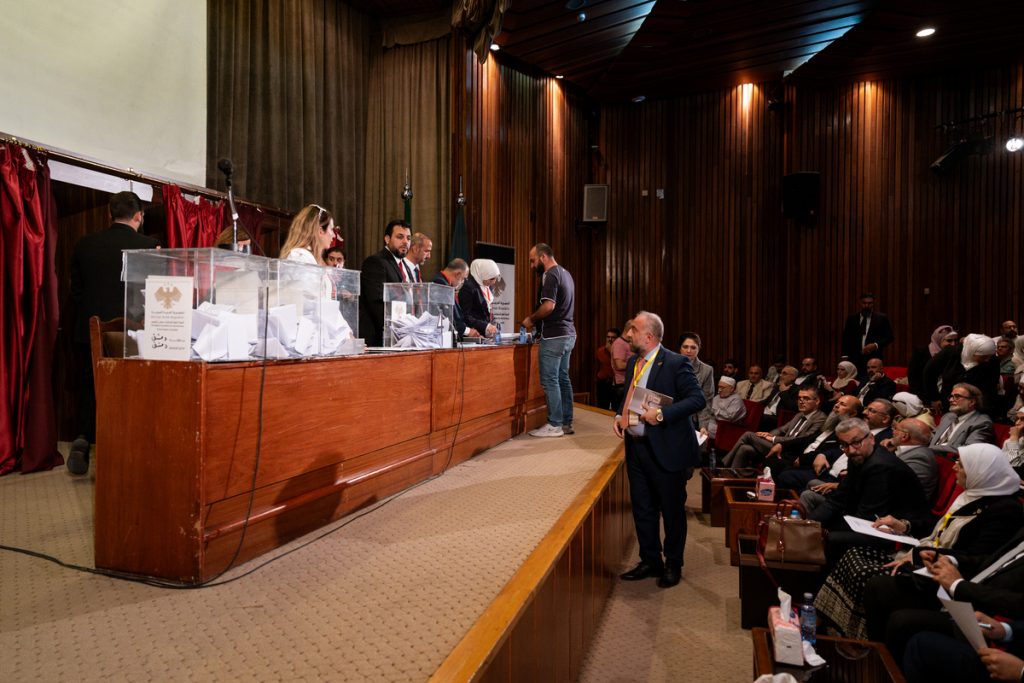
A vote limited to about 6,000 electors
Following Bashar al-Assad’s fall on 8 December 2024, Ahmed al-Sharaa assumed power as de facto leader. Five days later, on 13 December, the old Parliament was formally suspended by presidential decree. To fill the resulting institutional vacuum, the interim presidency introduced a new indirect voting system.
Around 6,000 electoral delegates, chosen by local committees in each governorate, were tasked with electing 140 MPs. Another 70 seats will be appointed directly by al-Sharaa, officially to ensure “diversity of representation” and offset the disruptions caused by war and displacement. The new assembly’s mandate is fixed at thirty months, until a new Constitution is drafted.
“The elections, in form, are bizarre – the committee electing two-thirds, and he [al-Sharaa] assigning the remaining seventy as if he were a king.”
But from the outset, the question lingered: how much power would truly leave the palace? Speaking to The Amargi, writer and sociologist Thaer Dib put it bluntly: “The elections, in form, are bizarre – the committee electing two-thirds, and he [al-Sharaa] assigning the remaining seventy as if he were a king.”
In each governorate, thousands applied to become electoral delegates, though no one could quite explain the criteria. In Damascus alone, some 2,000 candidates submitted files; only 500 were accepted.
Three governorates did not take part in the vote: Suwaida, largely Druze, and Raqqa and Hasakah, under the administration of the Autonomous Administration of North and East Syria (AANES), beyond the central government’s effective reach.
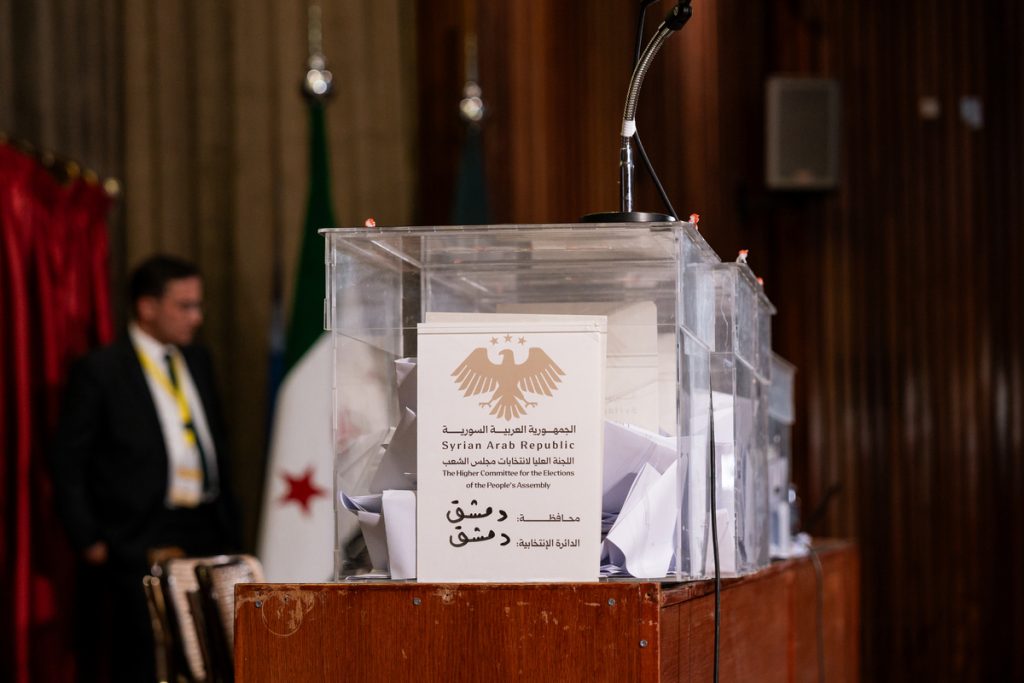
Officially, security concerns prevented elections there. Authorities now say that polls will be held later, “when conditions allow,” to fill the twenty-one vacant seats.
Analyst Benjamin Fève at Karam Shaar Advisory warns that if those seats are ultimately filled by presidential appointment, “it would raise a serious legitimacy problem — those regions would remain voiceless within the new assembly.”
First results and imbalances
“These results lay bare the country’s territorial fractures and the difficulty of building a representative framework over a divided land”
By late afternoon, the first results came in: 119 lawmakers elected. Six women. Barely ten from minority backgrounds. At the national level, women make up, for now, barely five percent of the new Parliament.
“These results lay bare the country’s territorial fractures and the difficulty of building a representative framework over a divided land,” observed Maen Tallaa, a Syrian political analyst. The decision to proceed without the three excluded governorates, he said, “was about maintaining institutional continuity — but their absence weighs heavily on legitimacy.”
In Damascus, 469 electors chose ten MPs. Before the vote, Lara Aizouqi, of the High Electoral Committee, had promised: “We aimed for 20 percent women — 40 percent in Damascus, because it’s more diverse here.” None were elected.
Arar, the young lawyer, welcomed the announcement of the Damascus results with emotion.
“For the first time, I feel the people’s voice counts,” he said. “The new MPs are educated, honest, revolutionary in spirit — a judge, an engineer, a doctor. I only wish there were more women.”
Between confidence and fatigue
Among those who keep faith in the process is Raghida Anouk Fatut, 70, an attorney at the Damascus Bar. Her yellow dress caught the light, her makeup was precise, her tone measured. “Given the circumstances, there was no other way. It’s important to participate, to stay optimistic,” she said.
On women’s representation, she added, “Let’s wait for the president to appoint the remaining seventy seats. Twenty percent of Parliament must be women — he will respect that, I’m sure.”
Some believed, until the day before, that they would be allowed to vote. Yazan, 30, a mechanical-engineering student from Deir ez-Zor, had hoped to take part. “We’ll finally elect real representatives! Under Assad, it was all decided beforehand.” Then he learned he couldn’t vote. “So this is democracy?” he asked.
Badran Chiya Kurd, Deputy Co-Chair of the Foreign Relations Department of the Autonomous Administration of North and East Syria (AANES), warned on Sunday that the current format of Syria’s parliamentary elections could deepen political divisions in the country.
Statements from groups opposing the interim government resonate especially in the aftermath of the massacres on ‘Alawis in March, the recent violence in Suweida, and in light of the new rulers’ record on inclusion and security.
A fragile transition
For Maen Tallaa, the elections mark a passage “from revolutionary legitimacy to state legitimacy.” He calls the process “acceptable in the current security and political context,” yet “unfinished.”
Defenders of the system call its behavior as being shaped by pragmatic compromise. Fourteen years of war have displaced millions of Syrians, many now absent from civil registries. Large parts of the country remain outside Damascus’s control. “No transitional process can be perfect,” notes Wael Alwan, another Syrian analyst. “It depends on the resources available — very limited in Syria — and the harsh circumstances the country endures.”
Still, the structure itself ensures that interim president al-Sharaa keeps a firm grip – through the direct appointment of one third of the assembly, and an opaque process to choose the delegates themselves.
Between hope and control
Under Assad, the Parliament was little more than a recording chamber for regime decisions. The new assembly, Benjamin Fève argues, “represents a first hope of political representation — one that still holds, for now.”
He sees in the results a “predominantly Sunni Arab” body, but one that “also includes Kurdish, Christian, and ‘Alawi figures.” “Representation is far from perfect, especially for women,” he added, recalling that under Assad, they made up about 11 percent of MPs.
For Fève, the seventy seats still to be appointed will determine whether the institution becomes more inclusive — or simply another extension of the executive. “Their balancing role will be crucial to correct the regional, sectarian, and social distortions created by the indirect vote. That’s where the real test lies — not in the election itself, but in how the executive chooses to accompany and rebalance the outcome.”
The question of whether those appointments will bring diversity or deepen control hangs over Damascus like the dust in the evening air. “Too early to say if this Parliament will truly represent the people,” Fève concludes. “The real test will be its ability to check the executive — and al-Sharaa’s tolerance for an authentic parliamentary debate — in an institution that, for now, lacks real powers.”
“Democracy may not be the immediate goal. The priority is a state that functions. In a presidential system, you need a Parliament at least partly aligned with the executive — otherwise nothing holds.”
Then, after a pause, he added what many here whisper: “Democracy may not be the immediate goal. The priority is a state that functions. In a presidential system, you need a Parliament at least partly aligned with the executive — otherwise nothing holds.”
Outside, Damascus looked unchanged. Queues stretched before ATMs of the Bank of Syria, and conversations circled around bread and fuel.
Paloma de Dinechin
Paloma de Dinechin is a Franco-Chilean investigative journalist based in Syria. She covers mainly Latin America and the Middle East, focusing on environmental issues, human rights, and organized crime.

